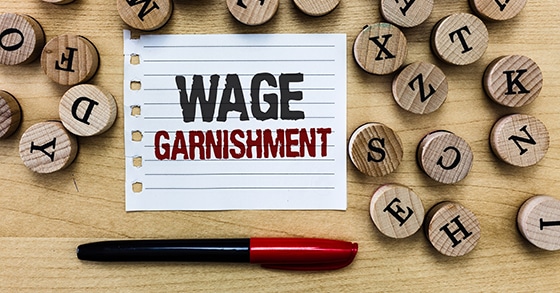Powell Tax Law Blog

Wage Garnishment: IRS Can Levy Your Paycheck to Satisfy Your Tax Debt
Paychecks these days seem to not go as far in the current environment of rising inflation, so imagine the heartache if a portion of those hard-earned dollars never make it to your bank account because the Internal Revenue Service (IRS) has garnished your wages.
“If you have an ongoing tax debt and the IRS feels that you’re not paying fast enough, it has the option of garnishing your wages,” explains seasoned tax lawyer Steve Powell. “A wage garnishment is simply a legal seizure of your wages so that the government can satisfy the outstanding debt. Typically, IRS wage garnishment is very severe and sometimes only allows you to keep a small portion of your wages.”
IRS Levy Power Allows Seizure of Wages, Bank Accounts, Vehicles, Real Estate and More
The IRS levy power allows the government agency to legally seize property to satisfy a tax debt including wage garnishment, taking money from bank accounts and other financial institutions, along with the selling of your vehicles, real estate, and other personal property.
“Taxpayers under threat of wage garnishment owe it to themselves to discuss their situation with a tax professional so that they understand all the options available to them,” said Powell. “Honestly, the best way to handle wage garnishment from the IRS is to avoid it in the first place by exploring all your avenues such as installment plans and offers in compromise.”
Bottom line: If you receive an IRS bill titled “Final Notice of Intent to Levy and Notice of Your Right to A Hearing”, contact a tax professional right away because the clock is ticking.
Powell explains the important steps that place when the IRS wants to garnish your wages:
- The IRS will contact your employer, and before the garnishment starts you’ll be asked to complete a garnishment form
- You’ll have three days to determine how many tax exemptions you’re allowed to take
- These exemptions will determine how much money you get to keep for living expenses.
“If you don’t complete the form in time, the IRS will proceed in a manner that works best for them,” said Powell. “With every paycheck, a portion will go to you and the rest will go to the IRS.”
Examples of How Much of Your Wages the IRS Can Take
Can the IRS really take a good portion of your salary to satisfy a tax debt? According to the TurboTax folks at Intuit, the answer is yes.
“When the IRS moves forward with your wage garnishment, your employer has no choice but to comply with the IRS and remit a portion of your wages to the agency to pay your tax bill,” says TurboTax. “The IRS has more garnishment power than ordinary creditors insofar as it is not subject to the state and federal garnishment limitations, which means it can leave you with very little money each week to live on.”
The examples of IRS wage garnishment are eye-opening:
- During 2021 for example, a single parent with two children who files as head of household can be left with as little as $526.92 per week
- This means that if you earn $1,000 per week, the IRS takes $473.08 of it
- If you earn $2,000 per week, it can take $1,473.08.
However, the amount of your wage garnishment will depend on how much tax you owe.
“Remember, unlike other creditors, it doesn’t have to go to court to get a judgement before garnishing your wages,” reminded Powell.
What You Need to Know About IRS Wage Garnishment
The IRS Taxpayer Advocate Service says one of the first things to understand about wage garnishment is that it is not a one-time levy, where the IRS takes an asset all at once, but it has a continuous effect.
“They remain in place until the IRS releases the levy or your debt is paid in full. For example: If you have a levy on your wages or certain federal payments have a continuous effect,” said the IRS Taxpayer Advocate Service. “A levy on your salary might take a portion of each paycheck until the IRS releases the levy – this is a continuous effect.”
This means that a levy on wages and salaries continuously attaches until it is released. Examples of property continuously attached include:
- Salary and wages, and
- Deferred compensation payments, such as retirement or pension income
By law, a portion of your wages are exempt from levy based on your filing status, additional standard deduction, and dependents.
To ensure the correct exemption amount is excluded from levy, your employer will ask you to complete a Statement of Exemptions and Filing status, Form 668-W, Part 3. Your employer will use it (Form 668-W) to compute the exempt amount.
If the employer does not receive the statement back from you in three days, the exempt amount is figured as if the person is married filing separately with no dependents (zero).
The IRS can also use the Federal Payment Levy Program (FPLP) to levy continuously on certain federal payments you receive such as Social Security benefits.
Under this program, the IRS can generally take up to 15 percent of your federal payments (including Social Security), or up to 100 percent of payments due to a vendor for goods or services sold or leased to the federal government.
A TAS brochure, What You Need to Know: The Federal Payment Levy Program can help you understand FPLP.
Other examples of assets the IRS might levy are your state tax refunds and payments you’re to receive from clients (accounts receivable).
Asking the Right Questions When IRS Wants to Garnish Your Wages
Powell says that when taxpayers are facing wage garnishment by the IRS, it is important to not only act quickly, but also to know the right questions to ask, such as:
- Did the IRS send you proper notices?
- Has the Statute of Limitations on the collection expired?
- Were your wages garnished while you were in bankruptcy?
- Do you have a spousal defense?
“The right answers to the above questions could help you get the wage garnishment lifted by the IRS,” said Powell. “There are other circumstances and options available to taxpayers. The key thing to remember is that if you must have your wages garnished by the IRS, it does not have to cripple you financially.”
Contact the tax professionals at Powell Tax Law today to find out your best option when the IRS wants to garnish your wages.


.webp?width=500&name=thumbnail_large-1(2).webp)




